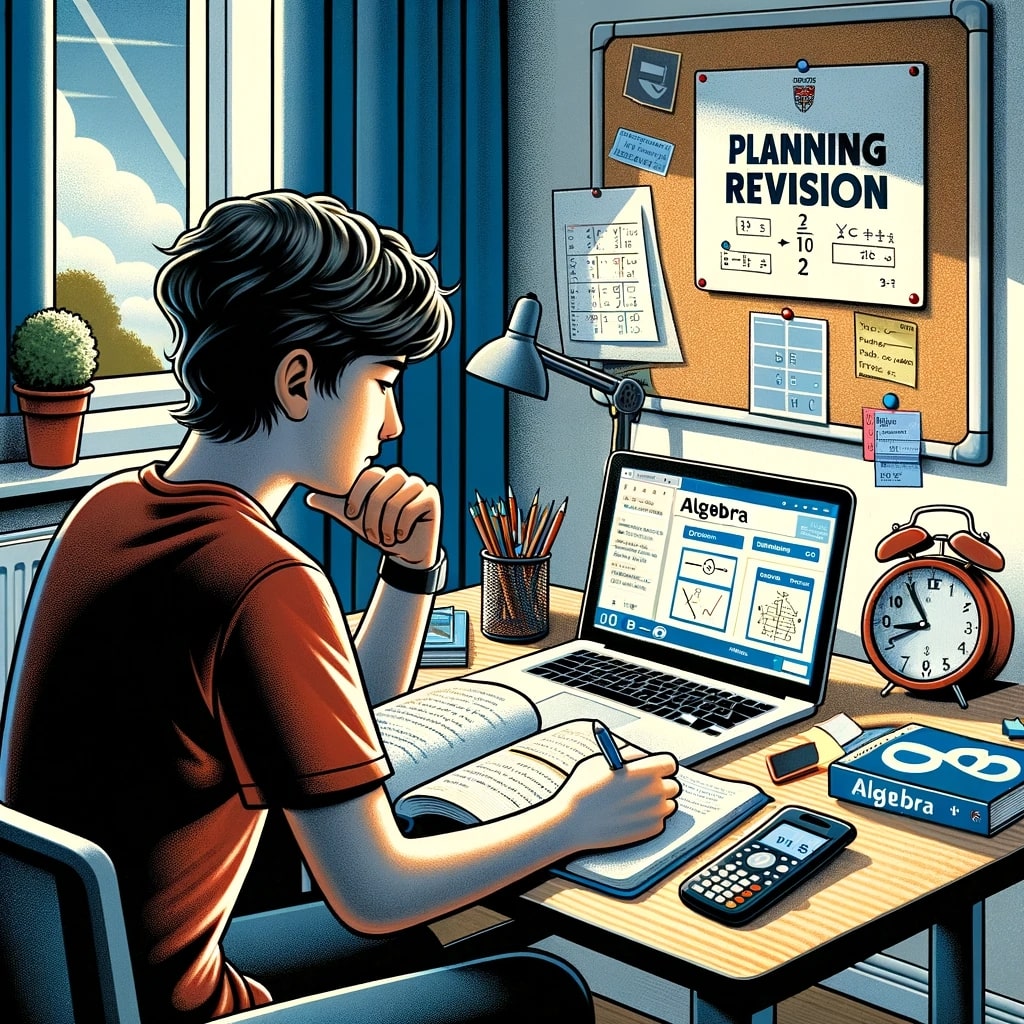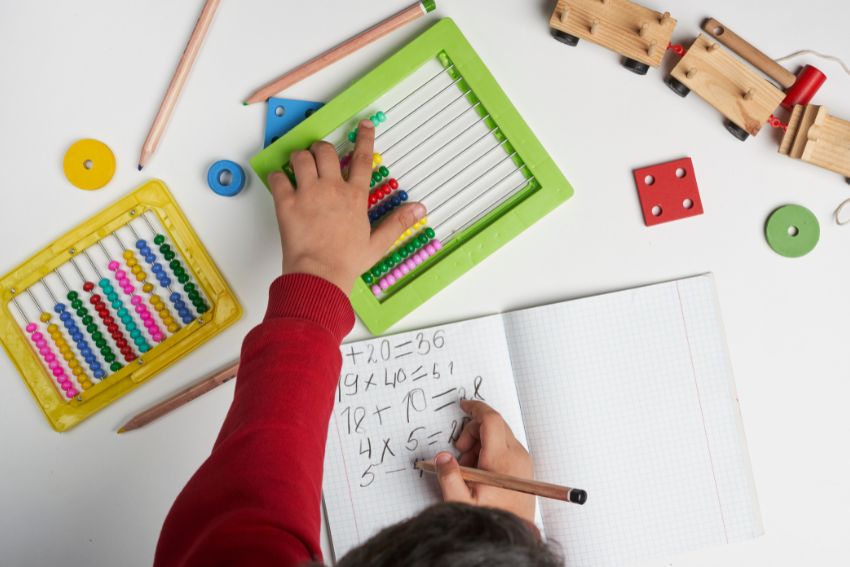So, your kid got their GCSE mock results and you are panicking because they failed…It’s tough for any parent to see their kid upset about their exam results. Does this mean all the studying and revision were for nothing? Will the child fail their GCSEs? Absolutely not!
Mocks are there for a reason – to pinpoint what students struggle with and what they’re good at, and to help them plan their revision accordingly. And you, as a parent, can help them with that, let’s see how.
How Can Parents Help After Mock Exam Setbacks?
Talk to Them Openly
Start by reassuring them that exam results don’t define who they are as a person.

Remind your child that the love and support of family and friends aren’t conditional upon their grades. It’s essential to frame these mock exams as what they truly are – a learning opportunity, nothing more.
Encourage them not to dwell on the results. Instead, focus on understanding the underlying reasons behind their performance. Ask them what they think they were lacking.
- Was it exam anxiety?
- Did they feel they hadn’t revised enough?
- Or was it something else?
This isn’t about laying blame, but about uncovering areas for improvement and growth. By approaching the conversation with empathy and openness, you create a safe space for them to express their concerns and plan for a more successful outcome in the actual GCSEs.

Plan Revision Schedule Together
After understanding where your child might be facing challenges, the next step is to help them plan their revision effectively.
After understanding where your child might be facing challenges, the next step is to help them plan their revision effectively.
Start by analysing the subjects and specific topics they’re struggling with.
- For example, if they performed well in geometry but didn’t do as well in algebra in their GCSE maths, it’s clear where their focus should be. Understanding what happens if you fail your GCSE Maths can also help motivate targeted revision in this critical subject.
- It’s also crucial to assess their time management skills. Sometimes, students feel overwhelmed not because they’re studying a lot, but because of inefficient planning. This can create a false sense of busyness, leading to frustration when results don’t reflect the perceived effort.
- Check if they’re truly revising effectively or just passively going over the material. In many cases, students believe they’re studying hard, but their methods don’t facilitate actual learning and retention.
- Introduce them to more active revision techniques. Practicing with past papers can be incredibly beneficial, as it not only helps solidify their understanding but also gets them accustomed to the format and time constraints of the actual exam. Flashcards are another excellent tool for reinforcing key concepts and facts.
Address Exam Anxiety
Exam anxiety is a common issue among students, with studies suggesting that a significant percentage, often upwards of 25%, experience this stress.

The causes of exam anxiety are varied and can include fear of failure, lack of preparation, high expectations from themselves or others, and past experiences with exams.
As a parent, understanding and addressing exam anxiety in your child is crucial for their well-being and academic performance. Here are some steps you can take:
- Help your child shift from a mindset of fear to one of confidence. Encourage them to focus on their strengths and past successes.
- Teach them relaxation techniques like deep breathing, meditation, or mindfulness exercises. These can help manage stress and improve focus.
- Ensure they maintain a healthy lifestyle with proper nutrition, enough sleep, and regular physical activity, as these are crucial for mental well-being.
Address exam anxiety proactively and with empathy, this will lead to a better GCSE grades.
Do GCSE Mocks Really Matter?
A common question among students and parents is the significance of GCSE mock exams. In reality, mocks serve a specific purpose: they are a valuable tool for students to identify their strengths and weaknesses.
Universities typically do not place significant emphasis on GCSE mock results. In fact, they sometimes barely consider GCSE grades, focusing more on A-levels or equivalent qualifications. However, there are circumstances where mock exams can play a crucial role.
One notable instance was during the COVID-19 pandemic when normal exam schedules were disrupted. In such emergencies, teachers may rely on mock exam results to determine final grades. Additionally, if a student misses a final GCSE exam and is ineligible for special consideration, teachers might use mock exam results to estimate the student’s performance.
Encourage your child to view the mock exams as a useful tool for their benefit, rather than something to fear.
What To Do If Your Child Fails Their GCSE Mocks
Discovering that your child has failed their GCSE mocks can feel overwhelming, but it’s important to remember that these exams are designed as a checkpoint, not the final destination. They provide an opportunity to identify areas for improvement and put strategies in place ahead of the real exams.
If your child is worried about their performance in the actual GCSEs, you might also consider a GCSE remark. Sometimes, a remark can make a significant difference to the final grade. For a step-by-step guide on how the remark process works, including timelines and costs, check out our blog on “GCSE Remark”. This can help you determine whether requesting a remark is the right course of action.
Steps to Take After Failing GCSE Mocks
Instead of focusing on the negative, help your child view the mocks as a tool for improvement. From creating a realistic revision plan to seeking extra support, there are many ways to turn things around before the final exams. Whether it’s hiring a tutor, attending study sessions, or simply adopting better study habits, consistent effort can lead to success.
Consider Additional Help
Sometimes, as a parent, you might feel that your support alone isn’t enough to address all your child’s needs during this crucial period. In such cases, it’s worth considering additional help.
If your child is struggling significantly with stress or anxiety, particularly if it’s affecting their daily life or studies, seeking the support of a therapist can be beneficial. A therapist can provide them with coping strategies and emotional support, helping them to manage their anxiety more effectively.
On the academic front, if you find that your child needs more targeted help in certain subjects, hiring a tutor can be a great investment. A tutor can offer personalised attention and tailor their teaching to your child’s specific learning needs and challenges. They can also provide additional practice and guidance, which can be crucial in areas where your child may be struggling.
Remember, seeking external help is not a sign of failure; it’s about providing your child with the best possible resources to succeed in their exams and manage their well-being.
FAQs
What happens if my child fails all GCSEs?
If a child fails all their GCSEs, it’s important to remember that there are still many options available to help them move forward in their educational or career path. Here are some steps they might consider:
- Retake the Exams: Many students choose to retake their GCSEs. Schools often support students in preparing for these exams a second time, and it can be a chance to improve grades.
- Vocational Courses: Vocational qualifications provide practical skills and training in specific job sectors, such as construction, beauty, or IT. These can lead to employment or further training at higher levels.
- Apprenticeships: Apprenticeships offer the opportunity to earn while learning and to gain practical skills in a professional environment. They cover a broad range of fields, from engineering to digital marketing.
- Further Education: Your child can still apply to colleges that offer courses with different entry requirements that don’t necessarily depend on GCSE results. These courses can lead to further qualifications or higher education options.
- Foundation Learning: This includes courses designed to help students progress to Level 1 qualifications. They often focus on basic skills and education alongside personal and social development.
- Advice and Guidance: It’s also beneficial to speak with a careers advisor who can provide tailored advice based on your child’s interests and skills, helping to map out potential next steps.
It’s key to support your child in understanding that there are multiple pathways to success, and a setback in exams can be a stepping stone to discovering opportunities that align more closely with their strengths and interests.
Can my child go to college without GCSEs?
Yes, your child can still go to college without GCSEs, as many colleges offer a range of courses that do not require GCSEs for entry. Here are some options available:
- Foundation Learning Courses: These courses are designed to help students gain basic skills and qualifications that can lead to further education or training.
- Vocational Courses: Vocational qualifications such as BTECs, NVQs, or City & Guilds can be started at entry-level or Level 1, which usually do not require GCSEs. These courses focus on practical skills in specific job sectors like engineering, health and social care, or business.
- Access to Higher Education Diplomas: For older students (usually 19+), Access courses provide a route into university for those who don’t have traditional qualifications.
- Apprenticeships: These are available for those who want to work and study at the same time. Apprenticeships can start at entry-level positions and do not necessarily require GCSEs.
- Adult Education Classes: For those looking to later return to education, adult education classes can provide qualifications in core subjects like maths and English, which can help in progressing to other courses.
Colleges often have supportive measures in place, such as career advice, to help students choose the best pathway based on their interests and skills, regardless of their academic background. It’s advisable to discuss directly with colleges to understand the specific entry requirements for courses of interest.
Can I still get a job if I fail my GCSEs?
Yes, you can still get a job if you fail your GCSEs. Many employers look for skills and qualities that aren’t solely academic. Here are some options and tips for getting a job without GCSEs:
- Entry-Level Jobs: Many sectors offer entry-level positions that don’t require specific qualifications. Jobs in retail, hospitality, and some administrative roles may focus more on your soft skills like communication, reliability, and willingness to learn.
- Apprenticeships: These provide on-the-job training and often lead to recognised qualifications while you work. Apprenticeships are available in various fields, including construction, business, IT, and more.
- Vocational Training: Consider vocational courses or training that can lead to certifications in specific trades or professions, such as plumbing, hairdressing, or care work.
- Work Experience: Gaining work experience through volunteering or internships can be a valuable way to build skills and strengthen your CV. It also helps in making connections that could lead to employment opportunities.
- Further Education: You might consider further education courses at a college that can provide you with the qualifications needed to move into a desired career path or job.
- Develop Transferable Skills: Focus on developing skills that are highly valued in many jobs, such as teamwork, problem-solving, and digital literacy.
While academic qualifications like GCSEs are important for many career paths, they are not the sole determinant of career success. Many people find rewarding jobs and build successful careers based on a combination of work experience, vocational training, and personal qualities.
Do mock GCSE results matter?
Mock GCSE results do matter in several ways, although they don’t count towards the final GCSE grades. Here are some reasons why mock results are important:
- Assessment of Understanding: Mock exams provide students and their teachers with a clear indication of what they have learned and understood so far. It highlights areas where students are strong and areas that need improvement before the final exams.
- Exam Practice: Mocks serve as a practice run for the actual GCSEs, helping students get used to the exam format, timing, and pressure. This experience can be invaluable in preparing them for the conditions they will face during their final exams.
- Feedback Opportunity: The feedback from mock exams can guide students on where to focus their revision. It also gives teachers insight into where additional support might be needed, either for individual students or for the class as a whole.
- Predicted Grades: Schools often use mock exam results to set predicted grades for university applications or sixth form/college entry. These predicted grades can impact opportunities for further education.
- Motivation: Mock results can motivate students to revise and prepare more effectively as they provide a tangible measure of their current performance relative to their target grades.
- Contingency: In extraordinary circumstances, such as those experienced during the COVID-19 pandemic, mock results have been used as part of the process to determine final grades when exams could not be held.
Therefore, while mock GCSE results are not directly counted towards the final grades, they play a critical role in preparation and can have significant implications for a student’s academic trajectory.
What happens if you miss a mock exam?
If you miss a mock GCSE exam, the approach can vary by school, but generally, the following steps are considered:
- Inform the School: If you know in advance that you’ll miss a mock exam due to a valid reason like illness or a family emergency, inform the school as soon as possible. Provide any required documentation such as a doctor’s note.
- Rescheduling: Many schools offer the possibility of rescheduling missed mock exams. This depends on the reason for absence and the school’s policy. It’s important to check with your school for specific arrangements.
- Impact on Predicted Grades: If the mock exam was intended to help determine predicted grades for college or sixth form applications, missing it could mean that the school will have to rely on other assessments or coursework to set these grades. It’s crucial to discuss how this might be handled with your teachers.
- Missed Practice: Missing a mock exam means missing out on valuable practice and feedback. If rescheduling isn’t possible, consider asking your teacher for the opportunity to sit the exam in your own time or at least review the exam paper to benefit from the practice.
- No Penalties: Typically, there are no direct penalties for missing a mock exam, as it doesn’t count towards your final grade. However, missing out on the feedback and experience can indirectly affect your preparation for the actual GCSEs.
It’s important to communicate openly with your teachers and school administration about any missed exams to find the best way forward.
Are the mock exams important?
Yes, mock exams are important for several reasons, even though they do not contribute directly to the final grades of your GCSEs:
- Preparation and Practice: They simulate the actual exam environment, which helps you get used to the format, timing, and pressure of the real GCSE exams. This experience is invaluable in building your exam-taking skills and confidence.
- Assessment Tool: Mock exams provide a snapshot of your current understanding and mastery of the subject matter. They highlight areas where you are performing well and areas that need more attention before the actual exams.
- Feedback: The feedback you receive from mock exams can be crucial in refining your revision strategy. It allows you to focus on specific weaknesses and improve your understanding in those areas.
- Predicted Grades: Schools often use the results from mock exams to set predicted grades for university applications or for entry into sixth forms and colleges. These predicted grades can influence your opportunities for further education.
- Motivation: Seeing the results of mock exams can motivate you to maintain or increase your study efforts. They serve as a wake-up call for many students about how much work they need to put in to achieve their desired grades.
- Backup in Unforeseen Circumstances: In exceptional circumstances, such as those seen during the COVID-19 pandemic, mock exam results have been used to help determine final grades when formal exams could not be held.
Given these reasons, taking mock exams seriously can significantly benefit your preparation and success in GCSEs. They offer a valuable opportunity to hone your skills and refine your study approach ahead of the final exams.








